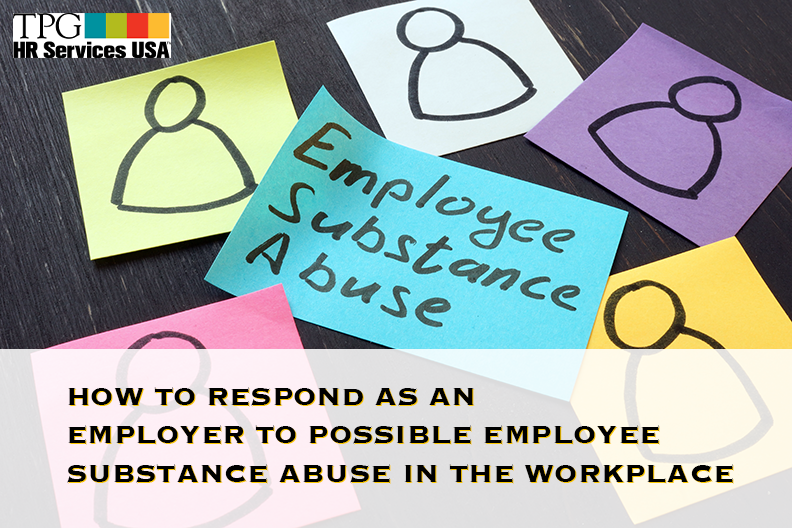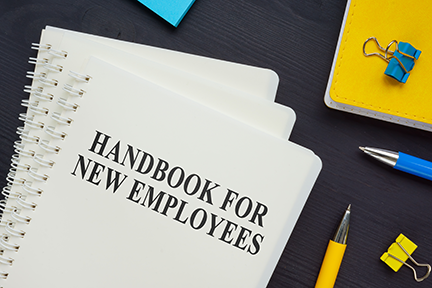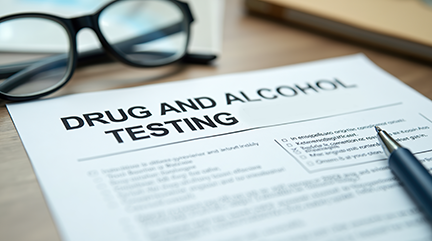
How to Respond as an Employer to possible Employee Substance Abuse in the workplace

Ms. Pomerantz is the CEO of TPG HR Services USA and has over 35 years of Human Resources practices experience. She holds a Master’s in Human Resource Management (MHRM) and is a certified Senior Professional in Human Resources (SPHR) and SHRM Senior Certified Professional (SHRM-SCP). Mary also serves as CEO of Mary Pomerantz Advertising, one of the largest recruitment advertising agencies in the country. Earlier in her career, she was president of the 17th largest staffing firm in the country.

As an employer, it’s essential to maintain a productive and safe work environment for all employees. One of the challenges that companies face is the possibility of employee substance abuse in the workplace. Workplace substance abuse problems can pose significant risks, not only to the employee’s well-being but also to the safety, morale, and overall functionality of the workplace. Here are some key guidelines to follow if you suspect an employee might be under the influence of drugs or alcohol while they are at work:
1. Know Your Company’s Policies
Before taking any action, employers should ensure they have clear and well-communicated policies regarding drug and alcohol use in the workplace. These policies should cover things like:
- Prohibited substances (drugs and alcohol)
- Consequences for violating the policy
- The process for addressing suspected cases
- Testing procedures (if applicable)
- Support options, such as employee assistance programs (EAPs)
The first recommended action is to create and add a formal written policy regarding drug and alcohol use during work hours to your employee handbook. The next step is to distribute this formal company policy to all your employees. Doing this will ensure everyone in the workplace knows your company’s expectations and consequences regarding drug and alcohol use during work hours.

2. Observe Employee Behavior and Document Concerns
When an employer suspects an employee is under the influence, observing and documenting any behaviors or signs that could indicate impairment is the beginning of the process. Any of the following behaviors are generally considered as possible signs of impairment:
- Actual odor of alcohol or drugs
- Slurred speech
- Difficulty walking or maintaining balance
- Altered physical coordination
- Very bloodshot or glassy eyes
- Changes in personality (agitation, lack of focus, mood swings)
It is important for employers to remember not to jump to conclusions. Observing and documenting possible signs of employee impairment at work provides a factual basis for the possibility of taking further action if necessary. Detailed notes that include the date, time, and the specific behavior observed should be taken and kept in the employee’s HR file. This documentation may become critical should there be a need for further disciplinary action against the employee or a legal defense on behalf of the company.

3. If You Suspect Employee Substance Abuse At Work, Address the Situation Privately and Respectfully With Your Employee
If an employer suspects that an employee is under the influence of drugs or alcohol at work and reasonable grounds have been demonstrated that show the employee is impaired, the next step is to address the situation privately with the employee. It’s essential you only speak to the employee in a confidential, private setting, away from other people, in an attempt to avoid any embarrassment or publicly creating a confrontational atmosphere. Employers should remain calm, professional, and non-judgmental during this conversation.
It’s important to ask the employee in question to explain themselves and to give them an opportunity to respond. This conversation should focus on gathering information and assessing the situation rather than making accusations. It’s important to take into account if the substance abuse at work is a result of the employee having an existing medical condition, which might include taking behavioral changing prescribed medication, or if they are dealing with a significant personal issue that recently occurred outside of work.

4. Follow Your Established Procedures as Defined in your Employee Handbook for Employee Drug and Alcohol Testing
If you suspect your employee is under the influence while at work, as their employer, you should follow an established procedure for testing and evaluation. Many workplaces require drug and alcohol testing for employees in certain positions or after an incident, such as an accident.
Employers should:
- Make sure the testing procedures are clearly outlined in the company’s policy and that employees are aware of them.
- Ensure that tests are administered fairly and consistently.
- Consider whether the employee should be sent home (with pay, if applicable) until the situation is resolved.
It is highly recommended that a trained professional administer your company employee drug and alcohol testing to ensure accuracy and fairness, and results should always be handled confidentially.

5. Offer Support and Understand Legal Implications
If the employee tests positive or admits to being impaired on the job, and if the employer deems it appropriate, they can recommend an Employee Assistance Program (EAP) that offers counseling services to help the employee address their substance abuse issue. However, workplace safety must always be the first consideration when dealing with an immediate workplace situation that could result in an employee causing bodily harm to themselves or others.
Additionally, employers should be mindful of any legal considerations, especially if the employee is a member of a protected group (e.g., those with disabilities or those covered by the Family and Medical Leave Act). Everything needs to be considered, and when deemed appropriate, employers may want to provide accommodations or a leave of absence for treatment or rehabilitation.
Legal compliance is crucial. Employers should be familiar with relevant laws, such as the Americans with Disabilities Act (ADA), which protects employees with a history of addiction to ensure they take the proper steps to avoid possible discrimination claims.

6. Take Appropriate Disciplinary Action
If the employee’s behavior violates company policy, disciplinary action may be necessary. Depending on the severity of the situation and the company’s policy, this can range from a warning to suspension or even termination.
Disciplinary actions should be fair, consistent, and based on the established guidelines. If the employee is given a second chance or an opportunity to seek help, clear expectations should be set, and a follow-up plan should be implemented.

7. Preventive Measures and Workplace Education
Preventing substance abuse issues before they arise is the best strategy. Employers should regularly provide training and education on the dangers of substance abuse and the importance of maintaining a safe, healthy work environment. Creating a workplace culture that emphasizes wellness, mental health, and support for those struggling with addiction can help reduce the likelihood of these issues occurring in the first place.
When possible, employers should consider offering substance abuse counseling, wellness programs, or other resources that encourage employees to seek help if needed.

Conclusion: When dealing with Employee Substance Abuse in the Workplace, the key is to Employ a Clear and Consistent Approach
When an employer suspects that an employee is under the influence of drugs or alcohol at work, it’s important to approach the situation carefully, respectfully, and in accordance with company policies. By observing behavior, documenting concerns, following procedures, offering support to address any underlying issues, and, if necessary, taking the appropriate disciplinary action, employers can help maintain a safe and productive work environment for everyone. This approach will not only help protect the health and safety of all employees but will also foster a workplace built on respect, trust, and fairness.
When You Partner with TPG HR Services
TPG HR Services can help your company with any employee relations issues. We can provide as much or as little HR help as your company needs. Give both your employees and your company the best chance to succeed by choosing TPG HR Services as your HR partner!
